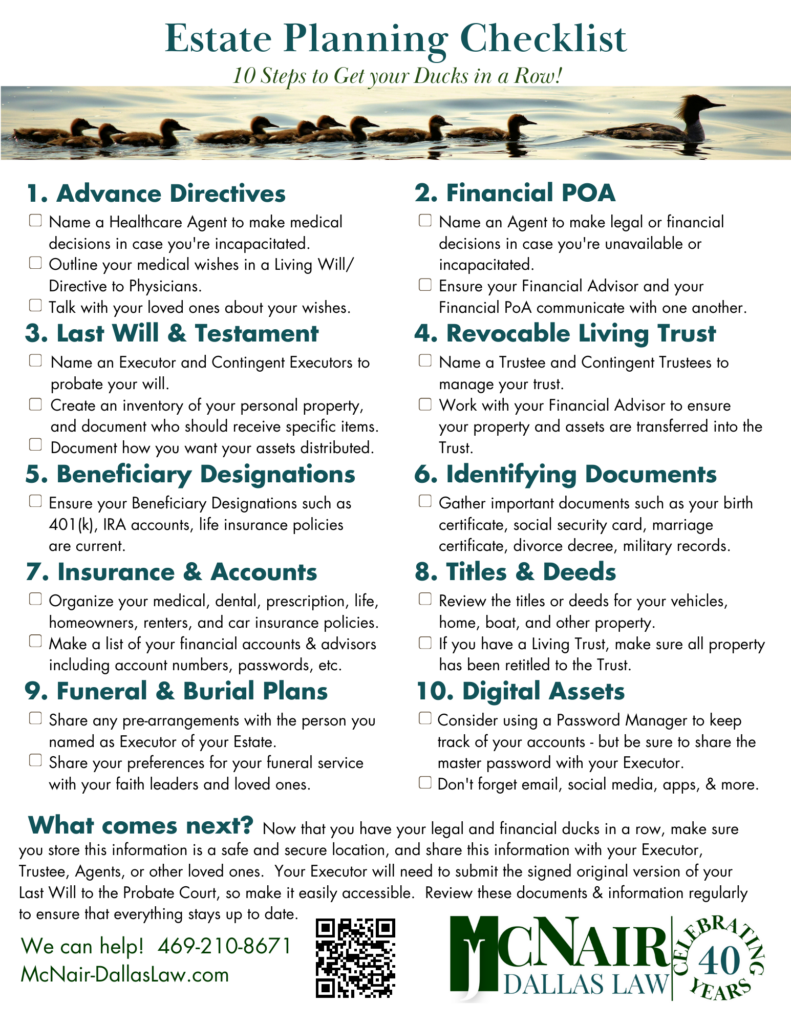Estate Planning might seem like a daunting task, but with the right guidance and resources, you can navigate this important process smoothly. The National Council on Aging (NCOA) Adviser’s article, “Estate Planning Guide and Checklist for 2024,” offers a comprehensive overview of what to consider when planning your estate. Whether you’re just starting out, or looking to refine your existing plan, the step-by-step checklist below will help you get organized, and make informed decisions.
Understanding Estate Planning
Estate planning is more than just writing a will – it’s a holistic approach to organizing your affairs, and making crucial decisions about your assets, healthcare, and legacy. At its core, estate planning involves:
- Determining who will make decisions on your behalf if you become incapacitated;
- Ensuring your assets are distributed according to your wishes;
- Minimizing taxes and other financial burdens to your estate; and
- Providing for the care and well-being of your loved ones, including dependents and pets.
To achieve these goals, you’ll need to create a set of legal documents that outline your wishes and designate trusted individuals to carry them out. The most common essential estate planning documents include wills, trusts, powers of attorney, and living wills, each serving a unique purpose in safeguarding your legacy and ensuring your wishes are honored. Be sure these documents are on your Estate Planning checklist!
Wills: The Foundation of Your Estate Plan
A will, also known as a “last will and testament”, is a legal document that specifies how you want your assets to be distributed after your death. Without a Last Will, your estate will be subject to Texas Intestacy Laws, which may not align with your wishes. By creating a will, you can designate an executor to oversee the distribution of your assets, and ensure your loved ones are provided for according to your instructions.
Trusts: Protecting Your Assets and Providing for Your Loved Ones
Trusts are powerful tools that allow you to transfer assets to beneficiaries while retaingin control over how and when those assets are distributed. Be sure to include Trusts on your Estate Planning Checklist. Unlike wills, trusts are not subject to probate, meaning your beneficiaries can receive their inheritance more quickly and privately. There are several types of trusts to choose from, including revocable trusts, irrevocable trusts, and testimentary trusts. An experienced Elder Law Estate Planning Attorney can explain the unique benefits and considerations depending on your circumstances.
Powers of Attorney: Empowering Trusted Individuals to Make Decisions on Your Behalf
A Durable Financial Power of Attorney grants authority to a designated individual (called your Agent) to make legal or financial decisions on your behalf. A Power of Attorney for Healthcare appoints an Agent to make medical decisions if you become incapacitated. By appointing a trusted Agent, you can ensure your affairs are managed effectively, and in accordance with your wishes, even in unforseen circumstances.
Directive to Physicians (or Living Will): Communicating Your Healthcare Preferences
Healthcare planning is an essential aspect of estate planning, allowing you to outline your preferences for medical treatment and end-of-life care. A Living Will, and other Advance Directives, enable you to communicate your wishes regarding life-sustaining treatment, organ donation, and other healthcare decisions, ensuring your values and beliefs are respected.
Tax Planning: Minimizing Tax Burdens on Your Estate
Taxes can significantly impact the value of your estate, but strategic planning can help minimize your tax liabilities and maximize the assets available to your beneficiaries. Understanding estate, inheritance, and gift taxes, as well as the tax laws specific to the State of Texas, can help you develop a comprehensive tax strategy that preserves your wealth and supports your legacy.
Estate Planning Checklist: Getting Your Ducks in a Row
Now that you have a better understanding of the key components of estate plannin, it’s time to take steps to ensure you have an estate plan that’s working for you. Get a printable copy of the Estate Planning Checklist provided below to get started.
Key Takeaways
- Common Estate Planning Documents: Wills, trusts, powers of attorney and living wills are all fundamental to estate plans.
- Everyone Needs a Will: Regardless of the size of your estate, a will is crucial to fulfill your wishes.
- Update Your Estate Plan Regularly: Significant life events necessitate updating your estate plan to reflect your current wishes and circumstances.
Conclusion
Consider estate planning to be a critical process to protect your assets, provide for beneficiaries and have peace of mind for the future. Remember that estate planning is not a one time event – it’s an ongoing process that should be reviewed and updated regularly. Life events such as marriage, divorce, birth, and incapacity, and death can impact your estate plan, as can changes in your financial circumstances or tax laws. Our Estate Planning Checklist can help you keep your goals in mind. Contact our office today to get started.
Reference: NCOA Adviser (Aug 21, 2023): Estate Planning Guide and Checklist for 2024.





